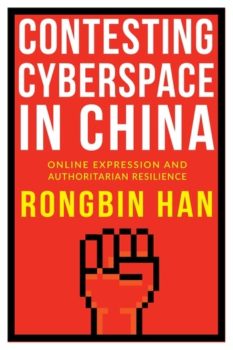Dr. Rongbin Han’s recent book, “Contesting Cyberspace in China” discusses how although the internet has allowed citizens in some countries to fight authoritarian control, China’s government has found ways to maintain control with the internet. As Han reveals throughout “Contesting Cyberspace in China,” the reason why China has been able to maintain an authoritarian regime despite the liberalizing effects of the internet is a bit counterintuitive.
In his book, Han discusses the sophisticated censorship system established by the Chinese government as well as the recruitment, training, and deployment of government-hired commentators popularly known as the “fifty-cent army.” However, Han found that in China, the government control over online discourse is not completely successful as netizens (internet users) constantly outsmart state censorship. Even so, the internet has thus far failed to pose a viable threat to authoritarianism as one might expect.
The underlying reason, quite ironically, is precisely the pluralization of online expression. Citizens voice a spectrum of views and issues ranging from staunch support of the government to criticism of the government, with the latter being neutralized and diluted by pro-government voices. To support his argument, Han details how nationalistic netizens who see themselves as patriots have fought against internet users who criticize the government. By discussing the surprising resilience of authoritarian rule in China despite the challenges of the internet, “Contesting Cyberspace in China” questions the democratizing power of the internet.
Dr. Rongbin Han has also started research for his next book which will look specifically at Chinese internet novels as vehicles of political experiences online and how the state has attempted to control, co-opt, and manage this process. Han explains that so far the state has been able to maintain control over internet novels to a large extent by making website editors responsible for censoring their authors’ writing.
However, some authors and readers circumvent the censorship to discuss political ideas by using coded language. In this way, the internet novels are being used as a form of political expression, despite censorship. However, the managed nature of the production and consumption of internet novels makes them instrumental for legitimizing authoritarian rule overall.
Han hopes to have this book complete in the next year.






